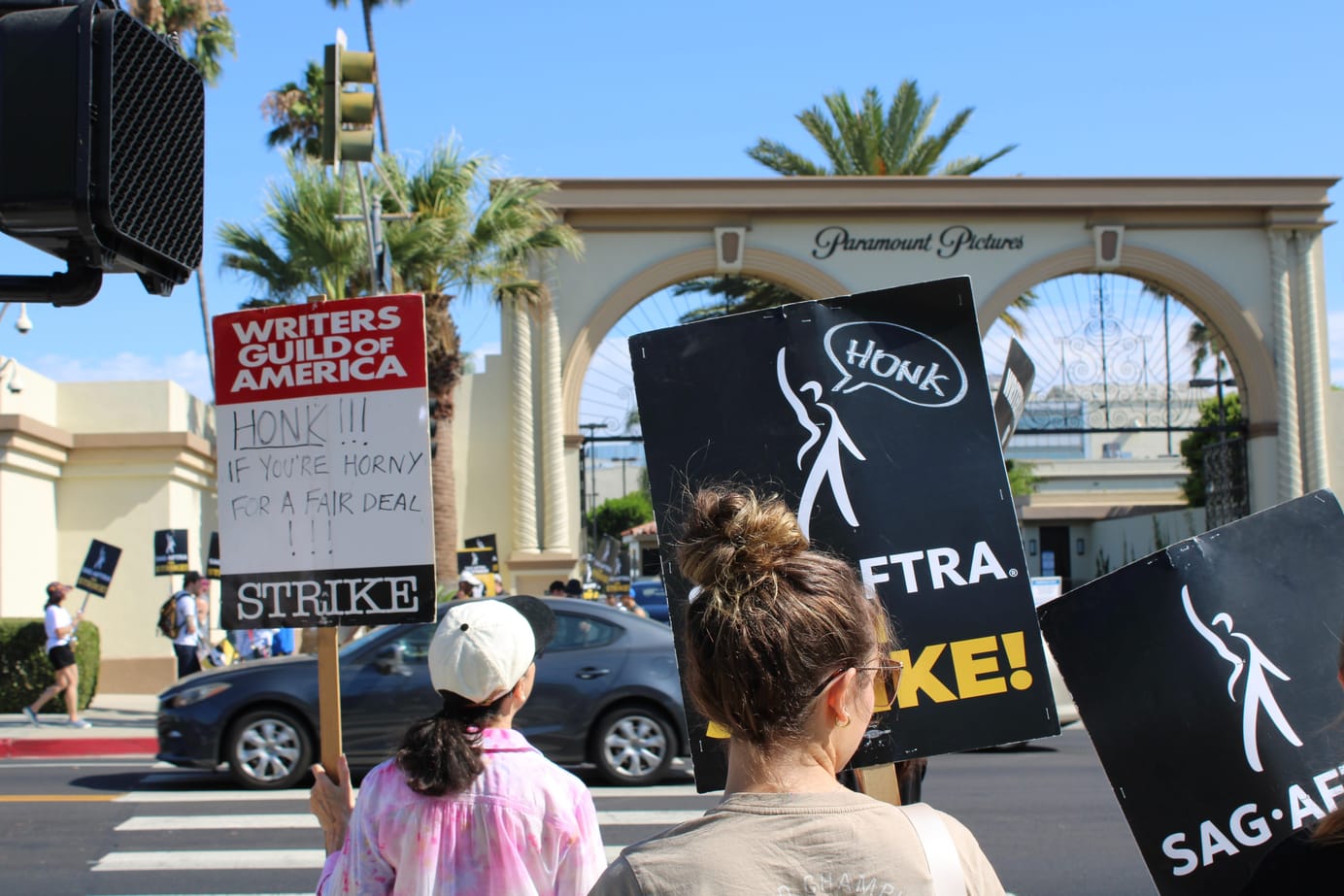
🌱 Hollywood's on Strike for Better 🎬 Content & 👷🏽♀️ Conditions for All
Part II: Modern Hollywood – Streaming, China, AI, & Workers Rights
🤓 Bite-Sized Knurd: The excessive need for growth under shareholder capitalism has caused an existential crisis in Hollywood that converged into this year’s writers and actors strikes.
In Case You Missed It: Leading with 💚 Heart & 🌍 Humanity in a Moment of International Tragedy
After a brief hiatus, we return for episode 2 of our series on Hollywood. (catch up here!) While we were interrupted for (and are still impacted by ❤️🩹) an important reason, it is emblematic of modern Hollywood to get interrupted and not know when or if a series is coming back.
While there have been real-world reasons for the film industry’s disruption (ahem, the pandemic), just like the climate crisis, much of the chaos in Hollywood is manmade.
Specifically, the rise in shareholder capitalism has caused various ripple effects to make the industry a less desirable product for the end consumer, which is us. Have you noticed any of these?
- Streaming services’ monthly rates keep going up, while it also seems like new shows come out less frequently.
- There seem to be more ads. Some platforms now have ads when they didn’t use to, while others run more ads at each break.
- The video quality on streaming shows and movies seems worse (darker screens, flimsier set designs).
- There are a lot more foreign films and shows on my feeds and it’s hard to filter just those made in my region.
- My favorite shows keep getting canceled after one or two seasons even though all of my friends watched them!
Seems like the lofty promises of streaming TV have actually been a recipe for hard-to-find, poor-quality, and boring content at crazy high prices for consumers, while a certain set of executives get richer.
The Streaming Business Model Has Failed
When Netflix’s streaming service bounced onto the scene in 2007, we were promised a wonderland of all of the TV and movies you could dream of. All at a cost less than your cable bill.
In the early days, these services really were able to impress. I used to rely on Hulu to watch all of my broadcast TV shows. Netflix had a deep library of big Hollywood movies. This early quality was because they were willing to be unprofitable to bring in new subscribers and there wasn’t a lot of competition.
Then Hollywood giants woke up and realized that they too could make money off of this streaming idea. Hulu’s original mission, a joint venture between studios to air recent TV episodes, was disbanded and studios began launching their own streaming services.
Now there are over 200 streaming services and every major studio has one. Studios blindly jumped at the chance for streaming profit. Unfortunately for executives, it was a shortsighted leap.
While there may be a larger pool of streaming services competing against each other, there’s still the same audience that’s consuming content. Cable TV and streaming TV are competing in a world overrun by content. When they couldn’t attract the eyeballs they wanted, they found other ways to try (& so far fail) to boost profits. Here are just some of the “creative” techniques they’ve used.
- Changing profit models to siphon wages away from the creators and crew towards executives caused a still ongoing strike.
- Streaming services pay significantly less in residuals (payments made to talent when a film or TV gets re-aired) than broadcast or cable TV.
- They have hiked their prices while limiting their investment in content. Most services are unprofitable because they pay so much for big talent or blockbuster content (i.e. Ryan Reynolds or Barbie).
- They’ve added more international shows to their platforms because they are cheaper to purchase the rights to.
- They’ve shrunk writers’ rooms to a few writers, demand faster turnaround times for entire seasons of TV, and don’t pay for writers to be on set during filming.
- Netflix has limited password-sharing abilities, forcing the choice to get out or pay up.
- They are quick to cancel shows due to “completion rate,” a metric that demands immediacy from its users.
Streaming services in the era of late-stage capitalism are blindly chasing profit without any consideration for the people that the services are meant for.
The problem now is that we don’t really have an alternative taking its place. Like most tech companies that “disrupted” an industry, Netflix destroyed broadcast and cable TV as we know it. So when a model that increasingly favors shareholder gains begins to fail, there is nowhere to turn. Most of the kids are almost exclusively on TikTok or YouTube now, but that’s not a true replacement for long-form storytelling content.
Luckily, the Hollywood strikes have focused its spotlight on the deterioration so that TV viewers can start to see the invisible threads that have made their content worse.
On Strike for Better Content
The Hollywood writer’s strike that lasted 146 days opened the country's eyes to the labor exploitation tactics that shrunk many full-time TV writers into gig economy workers. Forced to work in small writing rooms with a tiny staff and produce a TV show in weeks.
And once you begin to understand the greedy practices studio execs took to not pay the people who create the shows, the clearer it becomes why streaming TV has become less enjoyable. TV shows and films won’t be as creative under those conditions. Like most industries, the rise in shareholder capitalism has led to a decline in workers’ and consumer rights.
There are glimmers of good news with the writers scoring big wins in their deal. While the Writers Guild struck a deal with the studios, the Actors Guild is still on strike. The industry execs decided to walk away last week without plans to resume negotiations.
These companies refuse to protect performers from being replaced by AI, they refuse to increase your wages to keep up with inflation, and they refuse to share a tiny portion of the immense revenue YOUR work generates for them.
— SAG-AFTRA Negotiating Committee
What is clear to me is that the labor issue gaining steam in the U.S. is also a consumer issue and a human issue. The labor movement is working across a number of industries so workers benefit from the wealth they create and it is only growing in momentum.
I would much rather watch good TV from creators who love what they do and are able to live well. In fact, I feel that way about anyone’s job. Why shouldn’t we all be able to do what we love without fear of going bankrupt?

- 📚 Shoutout to my friend, MaríaEmilia Morazán, who wrote a great explanation for why marketing, or more specifically storytelling, must be a central focus for social impact organizations! Read her article here.
- 📲💲Digital Fundraising season is upon us! Luckily, the Center for Digital Strategy is hosting its Digital Fundraising Summit next week. RSVP for the October 24-26 event!
We’re cooking up a lot of new content and resources to support activists and organizations alike to cultivate messaging that connects. Help us share our resources more broadly by supporting our work.
the roots of change media ecosystem Newsletter
Join the newsletter to receive the latest updates in your inbox.



